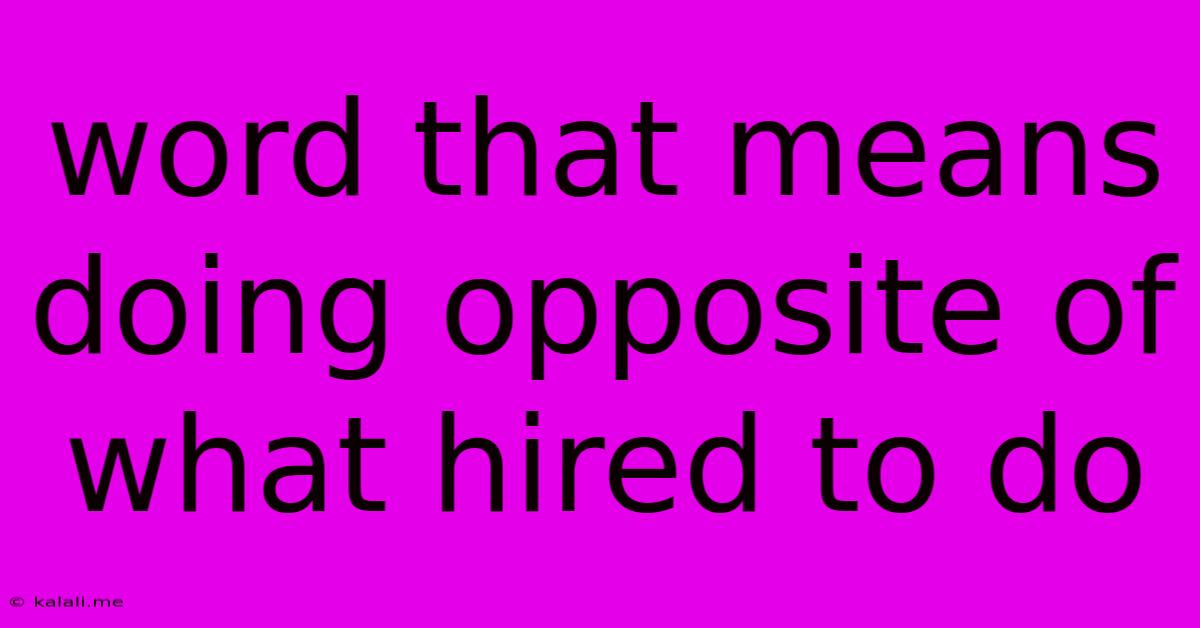Word That Means Doing Opposite Of What Hired To Do
Kalali
Jun 01, 2025 · 3 min read

Table of Contents
The Word That Means Doing the Opposite of What You're Hired To Do: Understanding Sabotage and Related Terms
Finding the perfect word to describe someone actively working against their employer's interests can be tricky. While there isn't one single perfect synonym, several words capture different nuances of this behavior. This article explores the best options, delving into their subtle differences and helping you choose the most accurate term for your specific context. We'll cover sabotage, undermining, counter-productive, and more, providing examples to illustrate their usage.
What's the best word to describe someone working against their employer? The answer depends on the type of opposition. Are they actively trying to harm the company, or are they simply inefficient and counter-productive? Let's examine some key terms:
Sabotage: Intentional and Malicious Acts
Sabotage is perhaps the strongest term. It implies deliberate and malicious acts aimed at damaging or destroying something. This goes beyond simple incompetence; it's a conscious effort to inflict harm. Examples include:
- Destroying equipment: Deliberately damaging company property.
- Leaking confidential information: Sharing sensitive data with competitors.
- Spreading misinformation: Deliberately misleading clients or colleagues.
- Tampering with products: Intentionally compromising the quality of goods or services.
Using "sabotage" suggests a serious breach of trust and potentially illegal activity.
Undermining: Weakening or Eroding Efforts
Undermining describes actions that subtly weaken or erode the effectiveness of someone or something. It might not be as overtly destructive as sabotage, but it still actively works against the desired outcome. This could involve:
- Passive aggression: Constantly complaining or resisting initiatives.
- Whispering dissent: Spreading negativity and discouraging others.
- Failing to cooperate: Refusing to contribute to team efforts.
- Withholding information: Preventing others from accessing necessary resources.
"Undermining" suggests a more insidious form of opposition, often characterized by hidden agendas and manipulative tactics.
Counter-Productive: Ineffective and Harmful Actions
Counter-productive describes actions that have the opposite effect of what was intended. While this might not always be deliberate malice, it still results in negative consequences for the employer. Examples include:
- Chronic lateness and absenteeism: Consistent failure to fulfill responsibilities.
- Neglecting duties: Failing to complete assigned tasks.
- Poor time management: Wasting time on unproductive activities.
- Ignoring feedback: Refusal to improve performance despite constructive criticism.
"Counter-productive" is a more neutral term, applicable to situations where the harmful actions are due to incompetence or negligence rather than malicious intent.
Other Relevant Terms: Treachery, Disloyalty, and Incompetence
Depending on the specific context, other terms might be appropriate:
- Treachery: This suggests a betrayal of trust, often involving secret actions against the employer.
- Disloyalty: A general term encompassing actions that violate the employee's obligation to the company.
- Incompetence: While not always intentional, consistent incompetence can severely harm the organization.
Choosing the right word requires careful consideration of the employee's actions, their motivations, and the overall context.
Conclusion: Selecting the Right Word for the Right Situation
The choice of word depends greatly on the severity and intent of the employee's actions. For deliberate and harmful acts, sabotage is the most fitting term. For subtle, weakening actions, undermining is more appropriate. For actions that are simply ineffective and detrimental, counter-productive might be the best choice. Remember to choose the word that most accurately reflects the specific situation. Using the right word will ensure clear and effective communication, both in casual conversation and in formal documentation.
Latest Posts
Latest Posts
-
How To Say Bug In Spanish
Jun 03, 2025
-
What Do Warped Rotors Look Like
Jun 03, 2025
-
Why When You Bring A Magnet Near An Electrical Circuit
Jun 03, 2025
-
How To Transfer Data From World Minecraft
Jun 03, 2025
-
What Is Kp Ki Kd In Pid Controller
Jun 03, 2025
Related Post
Thank you for visiting our website which covers about Word That Means Doing Opposite Of What Hired To Do . We hope the information provided has been useful to you. Feel free to contact us if you have any questions or need further assistance. See you next time and don't miss to bookmark.